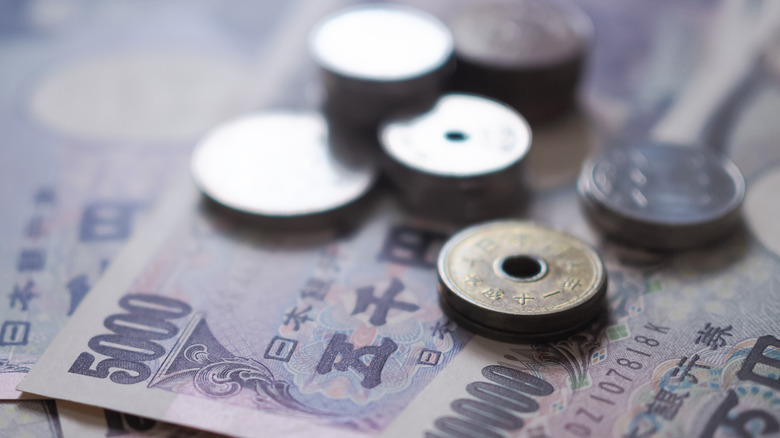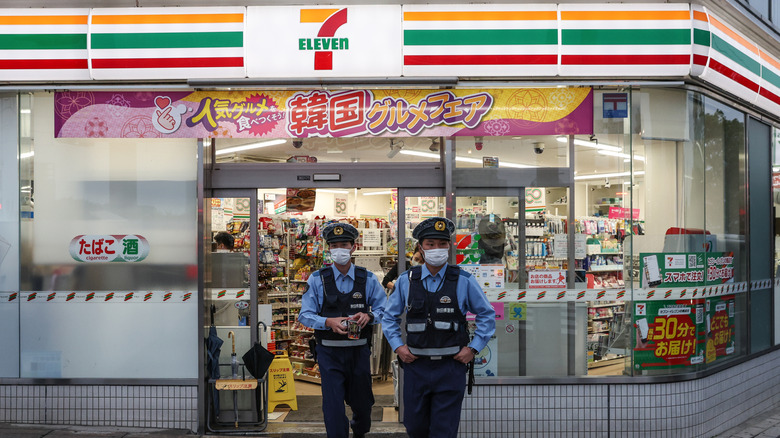The One Shopping Error That Could Get Tourists In Hot Water In Japan
While Japan has long been on many travelers' radar, it has recently exploded in popularity. Much of this is surely due to the favorable exchange rate, although you could also argue that more people are flocking to Japan because the secret is out — it's a gorgeous, friendly, fascinating, and very delicious place to visit. It's also one of the safest countries in the world, with the antisocial behavior and petty crime so common in other locations — such as pickpocketing in Europe — practically unknown in the Land of the Rising Sun. For example, you can leave a wallet stuffed with cash on a subway in Tokyo and most likely get it back without a single yen askew.
Japan has achieved this remarkable high-trust society through the cultivation of deeply-held customs and unspoken rules that dictate what is acceptable and what is not. This is a land where courtesy, structure, and consideration for others are prized as the highest values – so it pays to be a considerate tourist. The Japanese are very aware that everyone has a role to play in keeping things nice, and you see it every day in their correct lines, immaculate streets, and silent subway cars.
While much of this etiquette remains unwritten, it should come as no surprise that Japan also enforces much of it with codified law. Honesty is simply expected in Japanese society, but just in case, there are actual punishments for crossing the line, including such sins as walking away from a cash register after mistakenly receiving too much change.
Count those yen before you go
We've all been there: You make your purchase at the store, only to have the cashier — perhaps weary at the end of a long shift — hand you too much change. The better angel in you would let them know about the mistake and correct it on the spot, though you may also be tempted to walk away with that extra bit of cash in your pocket.
In most countries, the business would be liable for the mistake, but in Japan, the onus is on the customer. It is up to you to double-check your purchase price versus your change. If you stroll out that door with the incorrect amount in your favor, you could be facing not only a fine but also jail time.
This happened to a woman in 2015 who was arrested on swindling charges after leaving a convenience store with 45,000 yen ($288) mistakenly given to her as change by the cashier. She claimed she didn't notice the oversight, but that didn't stop her from getting tangled up with the police. This just shows how seriously Japanese society takes the idea of personal integrity, so take note before you visit, and once you're there, make sure to follow the rules perfectly.
Other quirky Japanese laws to be aware of
While Japan has a whole minefield of social etiquette to navigate while you're soaking up the country's goodness — like taking off your shoes before entering a house, never sticking your chopsticks vertically in a rice bowl, and refraining from pouring your own drink — other, more serious regulations are backed up by law.
It should come as no surprise that littering is forbidden anywhere in the country, with penalties of up to 30,000 yen. The Japanese are so concerned with tidiness that their national soccer team's fans have brought their own trash bags and cleaned up whole stadiums after World Cup matches.
In the spirit of mutual respect, defacing any kind of foreign flag is also an official no-no, as is walking down the street while smoking, aggressively cutting in line, and taking out the trash too early. You also risk the wrath of the authorities by possessing a foreign radio device, opening someone else's mail, bringing in banned flu or cold medicine, or even showing too much skin. For an unforgettable Japanese experience without the crowds of Tokyo, check out these two cities just as fabulous as Tokyo.


